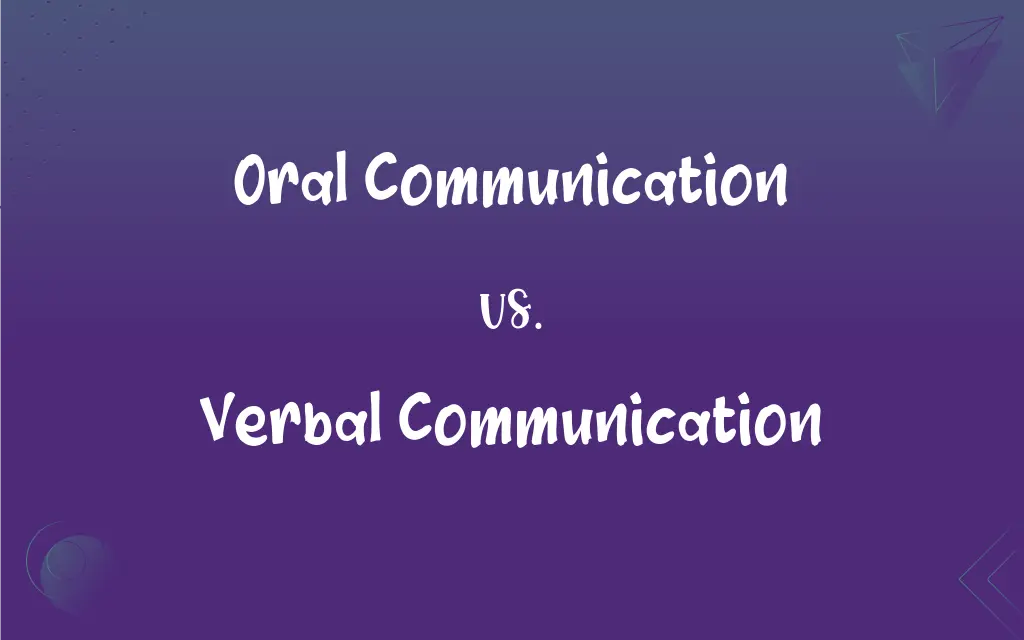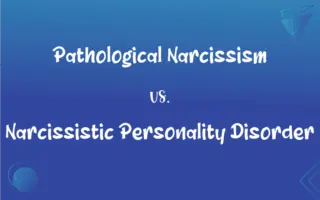Oral Communication vs. Verbal Communication: What's the Difference?
Edited by Aimie Carlson || By Janet White || Published on December 10, 2023
Oral communication is spoken language interaction, while verbal communication includes both spoken and written language.

Key Differences
Oral communication specifically refers to spoken words, where the message is transmitted through speech. Verbal communication, on the other hand, encompasses all forms of communication using words, including both oral (spoken) and written forms.
Oral communication is typically direct and immediate, occurring in real-time conversations and dialogues. Verbal communication, while including immediate spoken interactions, also extends to written texts where responses may not be immediate.
In oral communication, non-verbal cues like tone, inflection, and volume play a significant role in conveying meaning. Verbal communication, especially in its written form, relies more on word choice, structure, and language style to effectively convey messages.
Oral communication often requires the physical presence of both the speaker and the listener for effective interaction. Verbal communication, in its written aspect, allows for communication across time and space, transcending immediate physical presence.
Feedback in oral communication is typically instant and direct, allowing for immediate clarification or adjustment. In verbal communication, especially written, feedback can be delayed and may require further written or spoken clarification.
ADVERTISEMENT
Comparison Chart
Mode of Delivery
Spoken words only
Both spoken and written words
Immediate Interaction
Typically requires immediate interaction
Includes immediate (spoken) and delayed (written) forms
Non-Verbal Elements
Relies heavily on tone, inflection, and volume
In written form, relies on word choice and structure
Requirement of Presence
Often requires physical presence
Can occur without physical presence (in written form)
Feedback and Clarification
Typically immediate and direct
Can be immediate or delayed, depending on the form
ADVERTISEMENT
Oral Communication and Verbal Communication Definitions
Oral Communication
Oral communication is the exchange of information through spoken words in real-time.
Their oral communication during the crisis was crucial for quick decision-making.
Verbal Communication
Verbal communication is the use of words, both spoken and written, to convey a message.
Her verbal communication skills, both in writing and speaking, were excellent.
Oral Communication
Oral communication is an interaction that involves speaking and listening.
Oral communication skills are essential for effective team discussions.
Verbal Communication
Verbal communication encompasses all forms of communication that involve language, including talking, writing, and sign language.
Verbal communication is key in both presentations and email correspondence.
Oral Communication
Oral communication is a face-to-face verbal interaction between people.
The job interview tested her oral communication abilities.
Verbal Communication
Verbal communication refers to the expression of ideas through words in various formats.
He excelled in verbal communication, from delivering speeches to drafting reports.
Oral Communication
Oral communication is the process of verbally transmitting information and ideas from one individual or group to another.
During the meeting, his oral communication was clear and persuasive.
Verbal Communication
Verbal communication includes any form of message exchange using words, whether it's through a conversation or a written document.
The training focused on improving employees' verbal communication, including report writing.
Oral Communication
Oral communication refers to the use of spoken language to convey messages.
The teacher’s oral communication was engaging and kept the students’ attention.
Verbal Communication
Verbal communication is the process of communicating through word-based interaction, orally or in written form.
Her verbal communication was effective, whether she was speaking at a conference or writing a memo.
FAQs
Are listening skills part of oral communication?
Yes, effective listening is an integral part of oral communication.
Is body language a part of oral communication?
No, oral communication strictly involves spoken words, while body language is a form of non-verbal communication.
What does verbal communication include?
Verbal communication includes both spoken and written forms of using words to communicate.
What is oral communication?
Oral communication is the process of conveying messages through spoken words.
Can verbal communication occur asynchronously?
Yes, verbal communication, especially in written form, can occur asynchronously.
Is oral communication effective for long-distance communication?
Oral communication can be effective for long-distance communication, especially with technology like phones or video calls.
Can verbal communication be non-spoken?
Yes, verbal communication can be non-spoken when it involves written words.
Can non-verbal elements be part of oral communication?
While non-verbal elements like gestures aren't part of oral communication, tone and inflection are important.
How does context affect verbal communication?
Context significantly influences the interpretation and effectiveness of verbal communication, both spoken and written.
Are there cultural differences in oral communication?
Yes, cultural differences can greatly impact styles and interpretations of oral communication.
How important is writing in verbal communication?
Writing is a crucial aspect of verbal communication, especially in formal and professional contexts.
Is emotional expression easier in oral or verbal communication?
Emotional expression can be more immediate and apparent in oral communication but can also be effectively conveyed through written verbal communication.
Does oral communication require immediate feedback?
Oral communication often involves immediate feedback, but it's not always required.
Is grammar important in verbal communication?
Yes, proper grammar is important in verbal communication to convey clear and precise messages.
Can verbal communication be visual?
Yes, verbal communication can be visual, especially in written form, including text and sign language.
What skills are important for effective oral communication?
Skills like clear articulation, active listening, and appropriate tone are important for effective oral communication.
Can oral communication be recorded for future reference?
Yes, oral communication can be recorded, but it is typically experienced in real-time.
How does technology affect verbal communication?
Technology expands the reach and methods of verbal communication, enabling more diverse and distant interactions.
Does verbal communication always involve direct interaction?
No, verbal communication can occur without direct interaction, especially in written formats.
Can verbal communication include sign language?
Yes, verbal communication can include sign language as it's a form of language expression.
About Author
Written by
Janet WhiteJanet White has been an esteemed writer and blogger for Difference Wiki. Holding a Master's degree in Science and Medical Journalism from the prestigious Boston University, she has consistently demonstrated her expertise and passion for her field. When she's not immersed in her work, Janet relishes her time exercising, delving into a good book, and cherishing moments with friends and family.
Edited by
Aimie CarlsonAimie Carlson, holding a master's degree in English literature, is a fervent English language enthusiast. She lends her writing talents to Difference Wiki, a prominent website that specializes in comparisons, offering readers insightful analyses that both captivate and inform.







































































